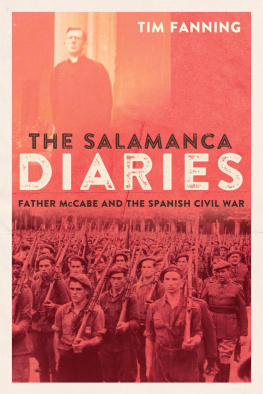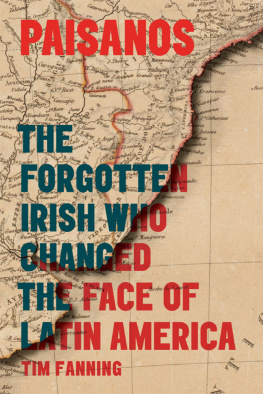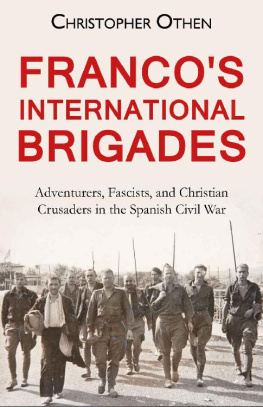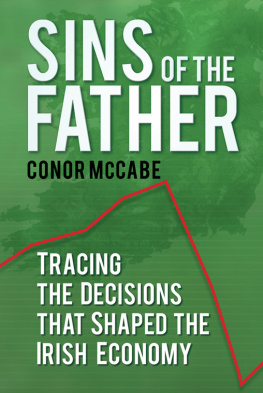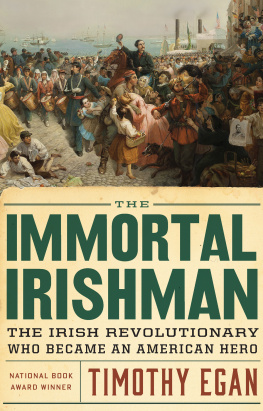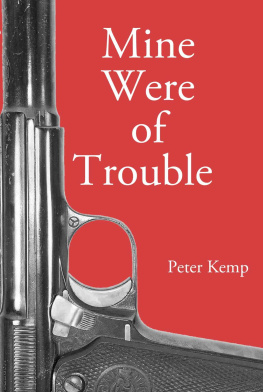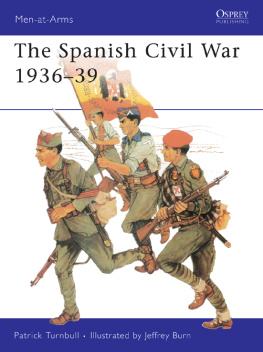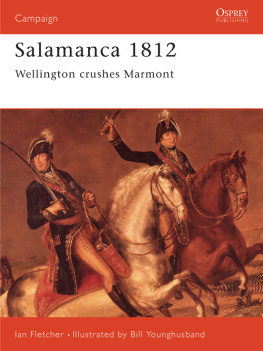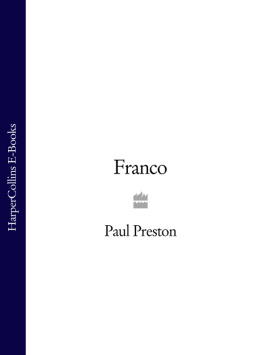THE SALAMANCA DIARIES
For Annalisa
THE SALAMANCA DIARIES
FATHER MCCABE AND
THE SPANISH CIVIL WAR
TIM FANNING
First published in 2019 by
Merrion Press
An imprint of Irish Academic Press
10 Georges Street
Newbridge
Co. Kildare
Ireland
www.merrionpress.ie
Tim Fanning, 2019
9781785372773 (Cloth)
9781785372780 (Kindle)
9781785372797 (Epub)
9781785372803 (PDF)
British Library Cataloguing in Publication Data
An entry can be found on request
Library of Congress Cataloging in Publication Data
An entry can be found on request
All rights reserved. Without limiting the rights under copyright reserved alone, no part of this publication may be reproduced, stored in or introduced into a retrieval system, or transmitted, in any form or by any means (electronic, mechanical, photocopying, recording or otherwise) without the prior written permission of both the copyright owner and the above publisher of this book.
Typeset in Minion Pro 11.5/15 pt
CONTENTS

ACKNOWLEDGEMENTS
I spent countless hours reading the diaries of Alexander McCabe in the Manuscripts Room of the National Library of Ireland in Dublin. I would like to thank all the staff for their courtesy and help. Mary Broderick and James Harte, in particular, made every effort to facilitate my requests. Many thanks to former archivist Susan Leyden, current archivist Anna Porter and the staff of the Russell Library, St Patricks College, Maynooth for their help in guiding me through the Salamanca Archive. I am also grateful to Noelle Dowling of the Dublin Diocesan Archives.
I am thankful to Regina Whelan Richardson, who has written about the Irish College and Asturias, for sharing her own research. The late Monica Henchy was a close family friend of Alexander McCabe and also wrote about the Irish College in Salamanca. I am indebted to her for sharing her memories of Padre Alejandro. I would also like to thank Professor Dermot Keogh for his recollections of Fr McCabe.
I owe a special debt of gratitude to Bridie Smith, who went out of her way to show me around Fr McCabes homeplace in County Cavan and put me in touch with people who knew him and the McCabe family. I would also like to thank the following for helping me with my research in Counties Cavan, Leitrim and Waterford: Noreen Clarke, Kathleen Conaty, Edmund Connolly, Fr Michael Cooke, Prin Duignan, Fr Liam Kelly, Fr Dnal Kilduff, Br Joseph Killoran, Felix Larkin, Ann Lynch, Donal McCabe, Fr Ultan McGoohan, Fr Tom McKiernan, Mgr PJ McManus, Liam McNiffe, Grinne Mhic Aonghusa, Mgr Michael Olden, Annette Smith and Fr Thomas Woods.
Thanks are also due to Joan Bennett, Kieran Fagan, Fr Dermot Fenlon, Fr Stewart Foster, the late Dermot Gallagher, who pointed out the John McGahern reference, John Horgan, Dr. Michael Kennedy, Mire Mac Conghail, Mire Mhac an tSaoi and Professor Eunan OHalpin. I also wish to thank Michael Lillis for his observations on the manuscript, which were invaluable, given his experience of Spain.
Many thanks to Professor Antonio R. Celada of the University of Salamanca for his enquiries on my behalf and Agustn Snchez for his guided tour of the Colegio Fonseca. The Sanmartn family in Pendueles has been looking after the Casa de los Irlandeses for almost a century. I am especially appreciative to Conchi Sanmartn Pidal, whose uncle, Domingo, was one of the many victims of the Spanish Civil War, and her husband, Miguel Rodriguez Cofio, for their warm hospitality to an unexpected visitor. I must also make mention of lvaro Reynolds for his help in translating some enquiries and requests into formal Spanish.
I am deeply grateful to Ian Gibson and Professor Paul Preston, both of whom took the time to read the typescript. It was their pioneering work which first provoked my interest in the Spanish Civil War.
Many thanks to Conor Graham and Fiona Dunne of Irish Academic Press and Jonathan Williams for his unstinting efforts to ensure the book was published.
I would also like to acknowledge the debt I owe to my late parents. My father, Ronan, grew to share my fascination with Fr McCabe and was a welcome companion on research trips to the border counties. My mother, Virginia, was always enthusiastic about my projects, whether doomed or fruitful.
Finally, thank you, Annalisa, for your constant good humour, patience and loving encouragement, and, of course, Chiara.
I started to keep a Diary in January, 1927, when I was in England. Since then, I have written 1,600,000 words. The best Diaries and the most faithfully kept were those for 1938, 1939, 1940, 1941, 1942, 1943, 1944 and 1945. I never missed a day and sometimes, I wrote several pages to a day. I put down everything that I thought to be interesting about life in the College, in Salamanca, and in Spain during those eventful years. They would make an interesting record of all this period. But there were some crudely bitter pages, especially about the cruelty of the Spanish Civil War, and so, before I went to Ireland at Xmas, I brought all these journals down to the furnace and burned the whole record. Perhaps, nobody would have the patience to read it, and if somebody had, he might be shocked at my comments and judgements on all this tragic period, and at the baldly-expressed cynicism, with which I regarded certain aspects of it. In all, I destroyed about 800,000 words, and it was time wasted, when I might have been learning German or revising Greek. Anybody reading some of the pages would feel that there is very little hope left for Western Europe and I expressed a fierce hatred for the German Nazis, who seem to have been the scourge of God of the 20th Century. Perhaps, my views were a bit lurid at times, but so were the flames that destroyed so many European cities, and have dissipated the wealth that had been accumulated for over a century.
Fr Alexander J. McCabe, Salamanca,
13 June 1946
INTRODUCTION
I first came across the diaries of Fr Alexander Joseph McCabe, the rector of the Irish College in Salamanca during the Spanish Civil War, while weighing up the idea of writing a book about the Irish Brigade that fought for Franco. McCabes perceptive observations about the colourful leaders of the brigade, including the quixotic figure of General Eoin ODuffy, were intriguing, not least because McCabe possessed a rare ability to sum up in a line or two an individuals key characteristics be they physical or psychological, intellectual or emotional. These brief sketches were not confined to ODuffys raggle-taggle band of adventurers. Franco chose Salamanca as his GHQ in the early stages of the civil war and McCabe met and scrutinised the generals, diplomats, journalists and spies from many nations who passed through the city. He was the perfect eyewitness: cool, detached and measured.
As I dug a little deeper, I became interested in his own life and character. From Drumkilly, a small rural townland in County Cavan, McCabe left Ireland when he was nineteen. For the next thirty-one years of his life, bar a brief period during 1929 and 1930, he lived abroad, first in Spain, as a clerical student, then as a curate in London and Essex, before he returned to Spain as first vice-rector and then rector of the Irish College in Salamanca. He was just thirty-five when he was appointed rector. A year later, in 1936, the Spanish Civil War began and the Irish clerical students were evacuated. For thirteen long years, McCabe was in charge of a college that had no students, until, in 1949, disillusioned, he returned home to Ireland.

